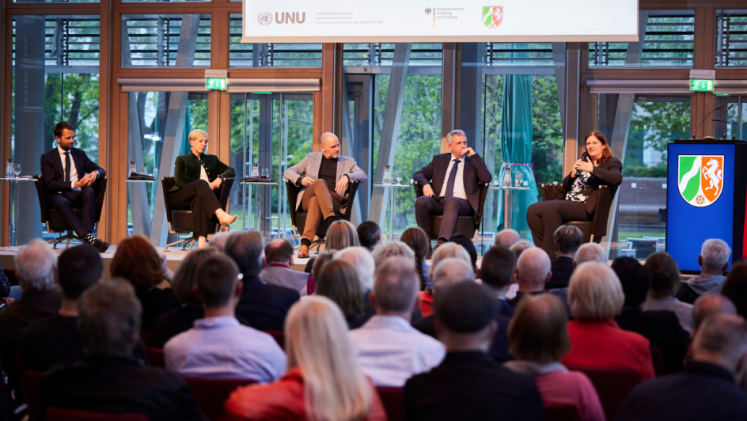UNU-VIE and UNU-EHS co-hosted an event on “Tipping Points, Disasters and Chain Reactions” at the permanent representation of North Rhine-Westphalia in Berlin. The opening speech was held by Dr. Mark Speich, North Rhine-Westphalian State Secretary for Federal, European and International Affairs, who called UNU one of the strong pillars of science in North Rhine-Westphalia. UNU Vice-Rector and UNU-EHS Director Prof. Dr. Shen Xiaomeng highlighted the importance of the financial support of the German federal and state governments through the Federal Ministry of Education and Research and the Ministry of Culture and Science of the State of North Rhine-Westphalia.
The discussion between Prof. Dr. Zita Sebesvari, Lead Author of the UNU-EHS Interconnected Disaster Risks report, Prof. Dr. Fred Krüger, Professor of Geography at FAU Erlangen-Nürnberg, Anja Käfer-Rohrbach, Deputy CEO of Gesamtverband der Deutschen Versicherungswirtschaft, and Dr. Peter Schniering, founder of Future Cleantech Architects, brought together different perspectives on systemic risks for Germany.
Prof. Dr. Sebesvari discussed the relevance of the findings of the most recent Interconnected Disaster Risks Report on risk tipping points for Germany, particularly highlighting groundwater depletion and the loss of insurability. She pointed out that Germany is at a crossroads, where, in many cases, it can still steer away from risk tipping points if it commits to a sustainable future today.
Ms. Käfer-Rohrbach confirmed from the perspective of the German insurance sector that “climate change is here. We see it in the damages, and the fact that the ‘disaster of a century’ happens every decade now,” a situation that makes it increasingly challenging and costly to insure against the resulting damages and that brings society closer to the risk tipping point of an uninsurable future, which was highlighted in the UNU report.
Dr. Schniering spoke from his perspective as the founder of a think tank that seeks to design and advocate for solutions to decarbonize industries that cannot so easily switch to low-carbon alternatives at the moment, for example construction or aviation. He highlighted that there are also positive tipping points when it comes to technological innovation, in that once a certain threshold of acceptance is crossed, a positive deployment process continues on its own.
Prof. Dr. Krüger highlighted the importance of positive narratives and hope, and of coming together across party lines to solve these pressing issues. The panel agreed that it is not too late to transform society and steer away from risk tipping points if we safeguard the tools we have to manage risks.
Partners for the event were the core donors of UNU-VIE and UNU-EHS, The Federal Ministry of Education and Research, and the Ministry of Culture and Science of the State of North Rhine-Westphalia.





